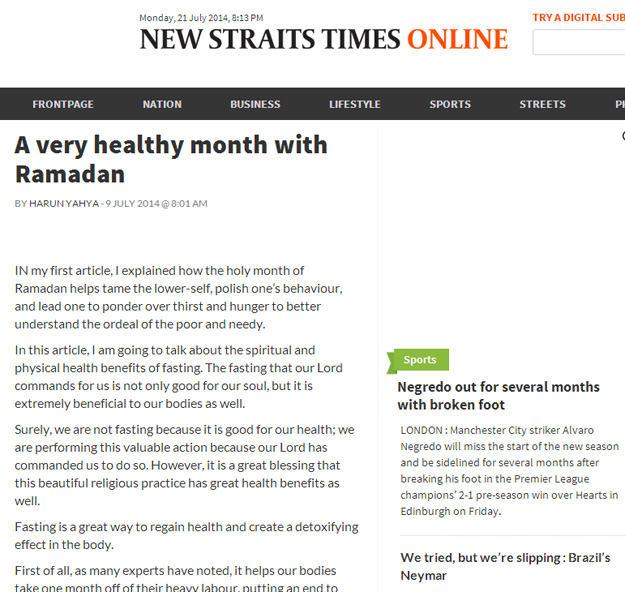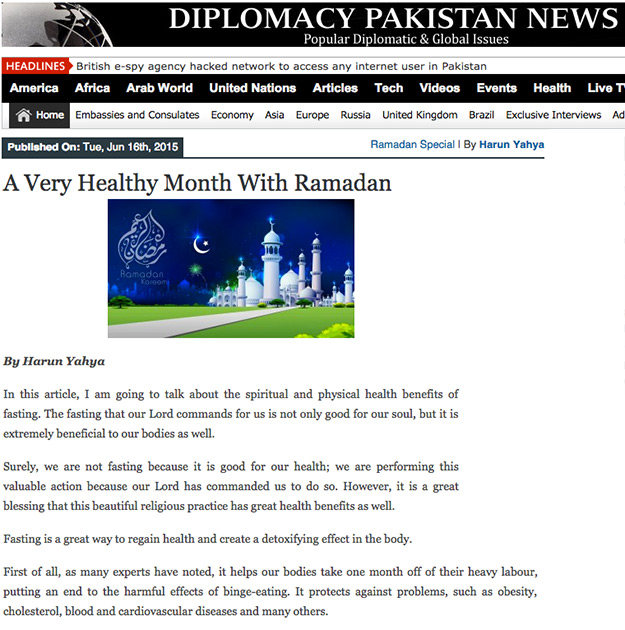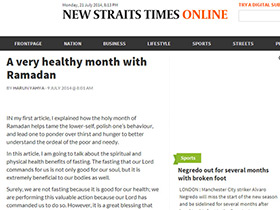
IN my first article, I explained how the holy month of Ramadan helps tame the lower-self, polish one’s behaviour, and lead one to ponder over thirst and hunger to better understand the ordeal of the poor and needy.
In this article, I am going to talk about the spiritual and physical health benefits of fasting. The fasting that our Lord commands for us is not only good for our soul, but it is extremely beneficial to our bodies as well.
Surely, we are not fasting because it is good for our health; we are performing this valuable action because our Lord has commanded us to do so. However, it is a great blessing that this beautiful religious practice has great health benefits as well.
Fasting is a great way to regain health and create a detoxifying effect in the body.
First of all, as many experts have noted, it helps our bodies take one month off of their heavy labour, putting an end to the harmful effects of binge-eating. It protects against problems, such as obesity, cholesterol, blood and cardiovascular diseases and many others.
Experts believe that irregular eating disrupts the lipid and cholesterol levels in the blood and, therefore, harms our bodies. However, in fasting, the blood circulates faster, eliminating the problems caused by cholesterol and obesity.
As known, persistent eating leads to cholesterol particles to stick to the walls of the blood vessels, leading to problems in blood circulation. No doubt, this prevents cell regeneration and slows down tissue repairs, which in turn speeds up ageing.
Lipid and cholesterol levels go down in those that fast and the blood vessels start to repair themselves. In other words, blood vessels are cleansed and the blood circulation is boosted. This regenerates cells and makes our bodies healthier and dramatically slows down ageing.
However, with constant eating the metabolism has a hard time digesting the food consumed all day long, putting an unnecessary strain on the digestive system. This also negatively affects the immune system.
However, with fasting, since food is consumed only during certain hours, the digestive system’s filter doesn’t get tired and starts working regularly. The time spent on digestion is shortened, giving more time to the organs involved to repair themselves.
The liver is also one of the organs that rests during fasting, while at other times it has vital duties. Every bit of food consumed means a new job for the liver as it has to regulate acids, methyl and nitrogen ion levels. While fasting, a stable balance is created in the system, relaxing the duties of the liver.
The tissue tension is eliminated and intra-cell pressure drops, giving a boost of energy to the body. While fasting, the liver starts using the stored glycogen, a process known as glycogenesis or glycogenolysis — depending on the type of the process — which is something it rarely does when not fasting and breaks down the fat storage to use them.
Glycogenolysis especially steps up during fasting and prevents weight gain. In other words, during fasting fat enzymes are used and the body breaks down more fat. After one month at this pace, the body gets used to this new practice and is able to go on with the same pace of fat burning for some time even after the month ends.
Another health benefit of fasting is reducing the amount of harmful and foreign substances that enter the body. During this process, the body is purified of harmful toxins. As the wastes circulating in the blood drops, the kidneys are more easily filtering out the urea and other toxins in the blood and the body feels more energetic and healthy as a result.
Another organ that greatly benefits from fasting is the pancreas. It doesn’t need to overwork itself to compensate for the excessive glucose levels and doesn’t secrete excessive insulin as a result. Since the blood pressure also drops, fasting helps against arteriosclerosis in addition to its support of the heart as the heart doesn’t need to work as much now.
Another organ that takes time off during fasting is, obviously, our stomachs. Normally, this organ has to work continuously trying to digest all the food we consume during the day, but is emptied during fasting and can rest for a minimum of six or seven hours. This reduces the amount of blood sent to the stomach and the heart doesn’t have as much difficulty as before as it doesn’t need to send lots of blood to the stomach anymore; this gives the heart the opportunity to rest, too.
The stomach being empty means that it doesn’t create unnecessary pressure on the diaphragm, which is another factor that helps the relief of the heart.
Also, small surface wounds on the stomach wall are repaired, cell surfaces are fixed and wounds heal. Accumulated toxins in the digestive cells are flushed out. This helps the stomach rest and the muscles can regenerate themselves.
The health benefits of fasting are too many to list here. As we lovingly and happily observe our religious duties towards our Lord, our systems get rest, regenerate and store energy for better functioning, while we are none the wiser.
May Allah accept the fasting of all the Islamic world this Ramadan, and award all our Muslim brothers and sisters the highest levels of Heaven with the most beautiful tables. But most importantly, may Allah allow us to gain His pleasure.
Adnan Oktar's piece on New Straits Times & Diplomacy Pakistan:
http://www.nst.com.my/node/11057
http://www.diplomacypakistan.com/ramadan-special/a-very-healthy-month-with-ramadan/



